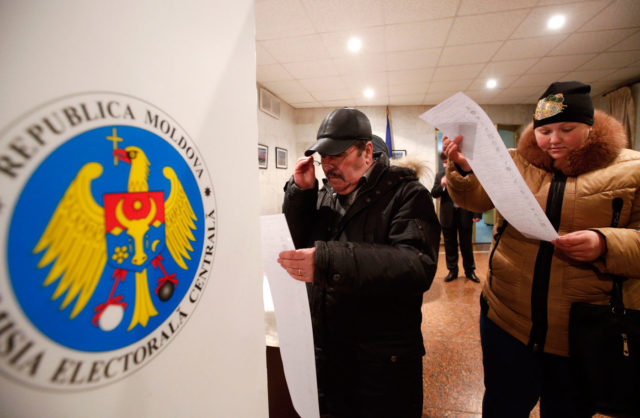
Moldova’s New Electoral Law Could Be Fatal to Pro-Western Parties (Part Two)
Publication: Eurasia Daily Monitor Volume: 14 Issue: 98
By:

*To read Part One, please click here.
Moldova’s new electoral legislation—“Law for Amending and Completing Certain Legislative Acts [i.e. the Electoral Code]”—is the outcome of a bargain between the country’s de facto leader Vladimir Plahotniuc, who controls the state apparatus, and the pro forma head of state, Igor Dodon, whose party tops all opinion surveys and is likely to take first place in any free elections. The legislation just enacted sets the stage for a post-election power-sharing agreement between Plahotniuc’s Democratic Party and Dodon’s Socialist Party (see Part One).
The new legislation transforms Moldova’s proportional system of voting by party lists into a mixed system: country-wide party lists (proportional) and territorial single-mandate constituencies (uninominal system), where individual candidates compete for one parliamentary seat. Each voter will cast two ballots: one for a party list and one for an individual candidate in the uninominal constituency.
Moldova used the proportional system from 1994 until now. The entire country formed a single electoral territory (circumscription), within which the parties competed for the parliament’s 101 seats. Under the new legislation, the country-wide proportional contest by party lists will adjudicate only 50 of the parliament’s seats.
This change correspondingly reduces the pro-Western parties’ chances to establish themselves in parliament (while they have practically no chance in the uninominal constituencies—see below). The new law, moreover, practically invites Transnistria’s residents to vote (see below), thus further diminishing the share of pro-Western parties in the proportional contest by party lists.
The threshold for parliamentary representation remains 6 percent: a high threshold, favoring the large parties of Dodon and Plahotniuc in the proportional redistribution of votes cast for parties that failed to pass the threshold.
Under the new legislation, 51 parliamentary seats shall be filled by the winners in 51 uninominal electoral constituencies. In each of them, the first-placed candidate wins. This places Sandu’s and Nastase’s small, under-resourced parties at a severe disadvantage vis-à-vis the big-party candidates or wealthy independent candidates. As several candidates will be running for one deputy’s mandate in each constituency, a candidate can (and probably will, in most cases) be elected deputy with less than 50 percent of the votes cast.
Remarkably, there will be only one round of voting in the uninominal constituencies. This deprives small parties of the chance to coalesce in the runoff against a big party that took first place in the first round. This amounts to a free pass for the first-round winner. Dodon’s Socialist Party is the main beneficiary, enjoying at least 40 percent support versus Plahotniuc’s Democratic Party with less than 10 percent in all public opinion polls. However, Plahotniuc’s control of administrative, media and financial resources can redress that balance for Plahotniuc’s candidates, who will run as “independents.” Dodon insisted and Plahotniuc accepted that there would be no runoffs (see Part One).
Candidates may run either as independents or under party banners in the uninominal constituencies. Only area-native candidates are allowed to compete in each uninominal constituency, including those reserved for Transnistria (see below).
Under the law’s final (but, in fact, still incomplete) version, the 51 uninominal constituencies are yet to be delineated on the electoral map. The text of the law seems to imply that approximately 35 of those are to be delineated on Moldova’s government-controlled territory (right bank of the Dniester River), with 55,000 to 60,000 registered eligible voters per uninominal constituency.
Several uninominal constituencies (within the overall number of 51) are to be created specially for Transnistria (left bank). Its residents shall be entitled to elect area-native deputies to Moldova’s parliament. Based on the same ratio of one Transnistrian deputy per 55,000 to 60,000 Transnistrian voters, this seems intended to work out to five parliamentary seats reserved for Transnistrians. The residents of Transnistria are also entitled (equally with the right-bank’s residents) to vote at the same time in the country-wide elections by party lists.
The Transnistrian candidates’ pre-election registration, as well as the residents’ voting on election day, would take place on government-controlled territory, under the oversight of Moldova’s electoral commissions. Transnistrian voters will cast their ballots in “special” polling stations on the right bank, separately from local right-bank residents, presumably enabling Transnistrian bosses to watch over their subjects as they vote. Meanwhile, there is no way for right-bank Moldovan parties and candidates to campaign on the left bank.
Several uninominal constituencies (still within the overall number of 51) shall be allocated to Moldova’s diaspora in Russia, Western Europe, and various other countries, proportionately to the numbers of potential voters in those diaspora communities. Dodon’s Socialists successfully insisted on such proportionality because Moldova’s largest diaspora is in Russia.
The new law merely provides a framework for the eventual allocation of diaspora constituencies, just as it does for the final delineation of uninominal constituencies on Moldova’s own map. The final decisions on allocation and delineation of uninominal constituencies will significantly influence the outcome of elections in advance. Those final decisions are delegated to an “independent commission,” whose composition shall (despite its nominal independence) be established by the government, and its decisions subject to the government’s approval. A wide range of political players and governmental institutions are invited to participate in this commission (Parliament.md, July 20; Monitorul Oficial al Republicii Moldova, July 21). The real bargaining, however, is likely to take place again between Plahotniuc and Dodon.



